The National Farmers Union is warning of sweeping changes to Canadian grain regulation it sees tucked into federal legislation meant to put through the successor deal to NAFTA.
Bill C-4, the implementing legislation for the Canada-U.S.-Mexico Agreement (CUSMA), passed second reading Feb. 6 and came back without amendment Feb. 27 from the Commons standing committee on international trade.
While C-4 is meant to amend various laws for CUSMA compliance, the NFU says the bill’s proposed changes to the Canada Grain Act “go beyond what is required” and would make “substantive changes to Canada’s grain quality control system.”
Read Also

Senft to step down as CEO of Seeds Canada
Barry Senft, the founding CEO of the five-year-old Seeds Canada organization is stepping down as of January 2026.
The CUSMA pact, as signed in Mexico City in December, has just four clauses relating to grain, only two of which call for changes to the Grain Act, the NFU said in a release Friday.
Those two clauses, the association said, would provide grades to U.S.-grown wheat according to the same quality standards and handling it as if it were Canadian-grown wheat.
However. the NFU said, C-4 goes further than CUSMA calls for, by amending the Grain Act so all U.S.-grown grains, not just wheat, would “become equivalent to Canadian-grown upon delivery into Canada’s grain handling system.”
In so doing, the association said, C-4 would allow grain companies to “increase their ability to use U.S.-grown grain to weaken prices paid to Canadian farmers by purchasing lower-priced American grain grown under U.S. Farm Bill subsidies.”
In its form at first reading, C-4 calls for the repeal of the Grain Act’s definition of “foreign grain,” replacing it with a definition of “imported grain” as “any grain grown outside Canada or the United States and includes screenings from such a grain and every grain product manufactured or processed from such a grain.”
C-4, the NFU said, would also “weaken (Canadian Grain Commission) authority to decide what constitutes contaminated or adulterated grain” and would make issuance of official export certificates “optional.”
The bill at first reading repeals the Grain Act’s current definition of “contaminated grain,” instead deeming grain to be contaminated “if the grain contains any substance in sufficient quantity that the grain is either… adulterated for the purposes of the Food and Drugs Act; or… contaminated within the meaning of the regulations made under section 51 of the Safe Foods for Canadians Act.”
C-4, the NFU said, would also “enable regulations that will allow inspectors to confer Canadian grades” on grain grown outside of both Canada and the U.S.
The bill, in its first-reading form, allows for the CGC to be able to issue “any certificate or other document setting out any information that the Commission considers necessary to facilitate the export of any grain.”
“As it stands, Bill C-4 is a Trojan Horse designed to make it easier for grain companies to pay farmers less for their grain,” NFU second vice-president Stewart Wells said in Friday’s release.
Fast-tracking C-4 “just weeks before planned consultations on revisions to the Canada Grain Act is an end-run around the public process that sidelines farmers and is contrary to the government’s claimed commitment to transparency,” he said.
That’s a reference to a review of the Grain Act, announced in March last year, to be conducted by Agriculture and Agri-Food Canada.
Federal Agriculture Minister Marie-Claude Bibeau said last month the process for that review “is still taking shape” but added the government remains “committed to holding consultations in order to hear from grain farmers, stakeholders and parliamentarians.”
The NFU, Wells said, is calling on Bibeau “to do the right thing and correct these mistakes (in C-4) before the final vote.” –– Glacier FarmMedia Network















